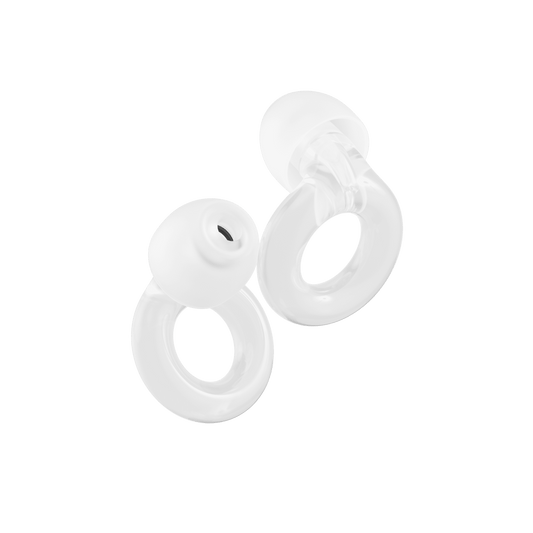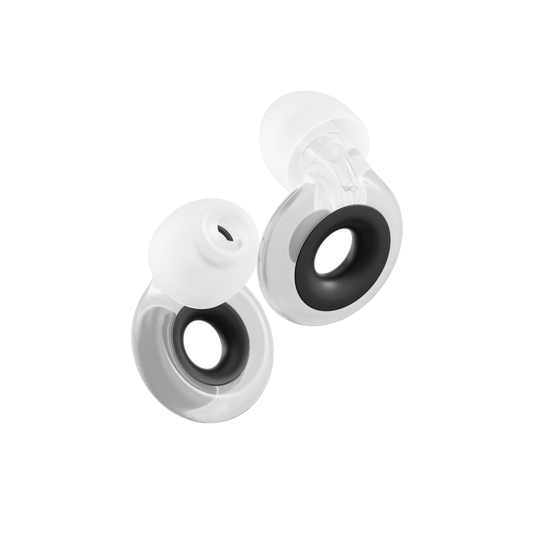Das Wichtigste in Kürze:
- Misophonie ist eine intensive emotionale Reaktion auf bestimmte Geräusche, von denen viele auch am Arbeitsplatz vorkommen, z. B. Kauen, Tippen und Stiftklicken.
- Sie kann sich stark auf die Arbeit auswirken, z. B. in Form von Anwesenheitsproblemen und Problemen mit Kollegen.
- Zu den Bewältigungsstrategien gehören eine offene Kommunikation, die Verwendung von lärmreduzierenden Ohrstöpseln, die Schaffung eines unterstützenden Arbeitsumfelds und die Anwendung von Techniken zur Stressreduzierung wie Tiefatmung und Achtsamkeit.
Spürst du ein Gefühl der Wut, wenn dein Kollege sein Mittagessen mit offenem Mund isst? Spürst du, wie dein Blutdruck steigt, wenn die Kaffeemaschine, der Drucker oder das Telefon klingeln? Ärgert dich die Person am Nachbartisch beim Telefonieren?
All das sind Anzeichen dafür, dass du möglicherweise an Misophonie leidest, einer intensiven emotionalen Reaktion auf bestimmte Geräusche. Scheinbar harmlose Geräusche können bei Menschen mit Misophonie negative Emotionen wie Wut, Angst oder Ekel hervorrufen - und am Arbeitsplatz können das Dinge wie Kauen, Tippen, Stiftklicken oder raschelnde Papiere sein.
Wenn diese Geräusche bei dir eine heftige Reaktion hervorrufen, kann es schwierig sein, damit bei der Arbeit zurechtzukommen - wo es überall unvermeidlichen Lärm gibt. Aber es gibt Möglichkeiten, mit Misophonie am Arbeitsplatz umzugehen, egal, wo du arbeitest. Von der Verwendung von Kopfhörern mit Geräuschunterdrückung, um die auslösenden Geräusche auszublenden, bis hin zur Einrichtung von Ruhezonen - es gibt Möglichkeiten, die Auswirkungen der Misophonie zu verringern und dein Arbeitsleben angenehmer zu gestalten. Aber wenn du keine Hilfe bei Misophonie am Arbeitsplatz bekommst? Das kann zu erhöhtem Stress und geringerer Produktivität führen und sich stark auf dein psychisches Wohlbefinden auswirken.
Deshalb erfährst du hier alles, was du über den Umgang mit Misophonie am Arbeitsplatz wissen musst, um ein glücklicheres, gesünderes und produktiveres Arbeitsleben zu führen.
Die Auswirkungen auf Misophonie am Arbeitsplatz
Misophonie ist relativ weit verbreitet. Studien zeigen, dass 1 von 5 Menschen in Großbritannien an dieser Krankheit leidet. Aber auch wenn sie relativ häufig vorkommt, ist sie nicht besonders gut erforscht - und das bedeutet, dass sie große Auswirkungen auf dein privates und berufliches Leben haben kann.
Die Krankheit kann sich u. a. auf deine Arbeit auswirken:

Probleme mit der Anwesenheit
Wenn es dir schwerfällt, mit auslösenden Geräuschen bei der Arbeit umzugehen, bist du vielleicht versucht, dich krank zu melden, nur um diese Geräusche zu vermeiden. Und selbst wenn du zur Arbeit erscheinst, kann der Stress, den die Geräusche verursachen, dazu führen, dass du häufig Pausen einlegen musst oder nicht produktiv bist, weil du versuchst, den emotionalen Stress zu bewältigen.
Dafür ist eine klare Kommunikation wichtig. Es ist wichtig, dass du offen und ehrlich mit deinem Arbeitsplatz über deine Krankheit sprichst, denn dein Vorgesetzter kann vielleicht Anpassungen vornehmen, die dir helfen, mit deiner Krankheit umzugehen. Du könntest zum Beispiel flexibel arbeiten oder einen anderen Arbeitsrhythmus wählen, damit du deine Symptome besser in den Griff bekommst, ohne deine Produktivität zu beeinträchtigen.
Begrenzte Berufswahlmöglichkeiten
Einige Arbeitsplätze sind lauter als andere - und das bedeutet, dass bestimmte Berufe oder Branchen für Menschen mit Misophonie nicht in Frage kommen können. Es kann sein, dass du in deiner Berufswahl eingeschränkt wirst, wenn du versuchst, Umgebungen voller auslösender Geräusche zu vermeiden.
Auch hier ist Kommunikation der Schlüssel. Du solltest dich in deiner Berufswahl nicht einschränken müssen, nur weil du Misophonie hast. Scheue dich nicht, mit Arbeitgebern und potenziellen Arbeitgebern zu sprechen, um herauszufinden, welche Vorkehrungen getroffen werden können, damit du am Arbeitsplatz besser mit Misophonie umgehen kannst.
Herausforderungen mit Kollegen
Misophonie kann die Beziehungen zu Kollegen belasten, was manchmal zu Konflikten oder sozialer Isolation führen kann. Stell dir vor, der Kollege, der neben dir sitzt, klickt jeden Tag mit seinem Stift. Dieses Geräusch frustriert dich und macht dich unruhig und wütend. Schließlich schnauzt du ihn an und es kommt zu einem heftigen Streit - keine gute Sache am Arbeitsplatz.
Die Frustration und Angst, die durch bestimmte Geräusche verursacht werden, können zu Missverständnissen und Unmut führen - aber auch hier kann Kommunikation helfen, das Risiko zu verringern. Ein offener Umgang mit der Misophonie und die Aufklärung der Kolleginnen und Kollegen über die Erkrankung können helfen, das Verständnis zu fördern und Konflikte zu minimieren.
Beruflicher Aufstieg
Wenn deine Arbeit viel Networking oder Reden in der Öffentlichkeit erfordert, kann es sein, dass du Gelegenheiten ablehnst, weil du Angst hast, an Konferenzen, Networking-Veranstaltungen oder Präsentationen teilzunehmen, weil sie potenzielle Auslöser sind - und in manchen Branchen sind diese Dinge entscheidend, wenn du in deiner Karriere weiterkommen willst.
Die Erkundung alternativer Methoden, um deine Fähigkeiten zu demonstrieren, wie z.B. schriftliche Kommunikation oder virtuelle Präsentationen, kann Menschen mit Misophonie dabei helfen, ihre Fähigkeiten zu zeigen, ohne durch ihre Erkrankung behindert zu werden.
Strategien zur Bewältigung von Misophonie bei der Arbeit
Der Umgang mit Misophonie am Arbeitsplatz kann eine Herausforderung sein, aber es gibt Strategien, die dir helfen können, sie effektiv zu bewältigen. Hier sind einige praktische Tipps, wie du mit Misophonie am Arbeitsplatz umgehen kannst:


Selbsterfahrung und Bildung:
Wie du vielleicht schon weißt, gibt es einen Zusammenhang zwischen Misophonie, Geräuschempfindlichkeit und Angstzuständen. Jeder Mensch reagiert anders auf Misophonie und ihre Auslöser. Wenn du auf bestimmte Auslöser leicht reagierst, können bei dir Misophonie-Symptome auftreten wie:
- Beklemmung
- Sich unwohl fühlen
- Der Drang zu fliehen
- Ekel
10M+ happy customers
Ausgewählte Kollektion
Es ist auch möglich, dass du manchmal heftiger reagierst und stärkere Reaktionen hervorrufst, wie zum Beispiel:
- Wut
- Ärger
- Hass
- Panik
- Angst
- Emotionale Not
In jedem Fall ist Misophonie nicht zum Lachen. Es ist bekannt, dass Menschen mit Misophonie in Situationen, in denen Triggergeräusche auftreten können, Erwartungsangst entwickeln.
Jeder hat andere Auslöser. Als jemand, der unter Misophonie leidet, ist es daher wichtig zu wissen, wo deine Grenzen liegen und Situationen vorauszusehen, die eine Reaktion auslösen könnten. Wenn du dir über deine Auslöser und Reaktionen im Klaren bist, kannst du deine Reaktionen besser steuern.
Schaffung eines förderlichen Arbeitsumfelds:
Der nächste Schritt zum Umgang mit deiner Misophonie am Arbeitsplatz besteht darin, deine Kollegen zu informieren. Nur wenn die Menschen am Arbeitsplatz von deiner Geräuschempfindlichkeit wissen, können sie sie berücksichtigen. Fangen wir also dort an: Es ist an der Zeit, deine Kollegen über Misophonie zu informieren. Es gibt viele Missverständnisse über Störungen wie Misophonie (und andere, wie Autismus). Die Leute könnten Fragen stellen wie "Ist Misophonie eine psychische Krankheit?", also sei darauf vorbereitet, mit einigen Mythen aufzuräumen.
Es ist wichtig, dass du erklärst, dass Misophonie eine anerkannte Störung ist, bei der die Toleranz für bestimmte Geräusche herabgesetzt ist, was oft intensive emotionale oder physiologische Reaktionen auslöst. Erkläre dann, welche Auslöser deine Misophonie hat. Das kann das Geräusch von Markern auf einem Whiteboard sein oder Kaugeräusche beim Mittagessen. Halte dich nicht zurück: Sag ganz offen, was dich auslöst. Überlege dir auch, wie du deine Misophonie idealerweise "behandeln" willst: Du kannst selbst Vorschläge machen und um angemessene Vorkehrungen bitten, z. B. lärmreduzierende Ohrstöpsel oder einen ruhigeren Arbeitsplatz, um die Belastung durch die Auslöser zu minimieren.
Du könntest auch darum bitten, in Teilzeit von zu Hause aus zu arbeiten oder deine Arbeitszeiten flexibel zu gestalten, damit du auf die Schwankungen deiner Reizüberflutung reagieren kannst.
Wenn Besprechungen oder die gemeinsame Nutzung von Büroräumen mit Kolleginnen und Kollegen Probleme bereiten, solltest du einzelne Kolleginnen und Kollegen ansprechen, die Geräusche machen, die dich auslösen. Wenn du sie unter vier Augen ansprichst und dich ruhig und diplomatisch verhältst, besteht die Chance, dass es nur eine Frage der Wahrnehmung ist und sie sich gerne anpassen.
Erkläre, was Misophonie verursacht und auf welche Geräusche du besonders reagierst, wenn du glaubst, dass das Gespräch produktiv sein könnte.
Anwendung von Techniken zum Stressabbau:
Wenn es auf der Arbeit hart auf hart kommt und es dir schwerfällt, mit auslösenden Geräuschen umzugehen, gibt es viele diskrete Stressreduzierungstechniken, die du bei der Arbeit anwenden kannst, um mit Misophonie-Auslösern umzugehen, ohne dabei Aufmerksamkeit auf dich zu ziehen:
- Tiefe Atemübungen kannst du ruhig an deinem Schreibtisch machen, um dich zu entspannen und Verspannungen abzubauen
- Achtsamkeit - die Konzentration auf den gegenwärtigen Moment - kann dir helfen, ruhig und konzentriert zu bleiben, wenn du mit auslösenden Geräuschen konfrontiert wirst
- Hören von beruhigender Musik, um eine beruhigende Umgebung zu schaffen und die Anzahl der potenziellen Auslöser zu reduzieren.
Außerhalb des Arbeitsplatzes können regelmäßige körperliche Aktivität und Stressbewältigungstechniken dein allgemeines Wohlbefinden deutlich verbessern. Wenn du eine Aktivität findest, die dir Spaß macht, sei es Yoga, Laufen oder ein Besuch im Fitnessstudio, ist das der beste Weg, um sicherzustellen, dass du regelmäßig Bewegung in dein Leben bringst. Außerdem können Entspannungstechniken wie progressive Muskelentspannung oder geführte Meditation außerhalb der Arbeit dazu beitragen, deine Bewältigungsfähigkeiten zu verbessern, Stress besser zu bewältigen und die Auswirkungen von auslösenden Geräuschen zu reduzieren.
Zeitmanagement und Pausen:
Es ist für jeden wichtig, während des Arbeitstages Pausen zu machen - und Menschen mit Misophonie sind da nicht anders. Regelmäßige Pausen an ruhigen Orten geben dir die Möglichkeit, dich zu entspannen und neue Energie zu tanken. Ob ein kurzer Spaziergang im Freien, tiefe Atemübungen oder das Hören von beruhigender Musik - regelmäßige Pausen in deinen Arbeitstag einzubauen, kann dazu beitragen, dass du dich besser konzentrieren kannst und widerstandsfähiger gegen auslösende Geräusche bist.
Wenn du dein Zeitmanagement in den Vordergrund stellst und proaktive Schritte zur Stressbewältigung unternimmst, kannst du ein angenehmeres und produktiveres Arbeitsumfeld schaffen, auch wenn du Geräuschen ausgesetzt bist, die deine Misophonie auslösen.
Lärmreduzierende Ohrstöpsel zur Entlastung am Arbeitsplatz verwenden
Eine der effektivsten Möglichkeiten, mit Misophonie am Arbeitsplatz umzugehen, ist die Reduzierung von Reizen in deinem Arbeitsbereich. Das kann bedeuten, dass du den Raum mit Schallschutzwänden oder Schalldämpfern abschirmst oder ein eigenes Büro benutzt.
Vielleicht erlaubt dir dein Arbeitgeber auch die Nutzung von weißem Rauschen oder Umgebungsgeräuschen, die dir helfen, dich zu konzentrieren. Du kannst auch darum bitten, beruhigende Musik zu hören, z. B. eine Playlist mit weißem Rauschen, oder ein Headset mit Geräuschunterdrückung zu benutzen.
Wenn du einen diskreteren Ansatz wählen willst, Ohrstöpsel für Misophonie einen subtileren Weg, um Geräusche herauszufiltern, ohne sie komplett auszublenden oder Distanz zu schaffen. Es wird nicht empfohlen, dass Menschen mit Misophonie ständig Ohrstöpsel tragen, denn das kann die Krankheit auf Dauer verschlimmern. Aber sie sind ein hervorragendes Hilfsmittel, um eine Toleranz gegenüber auslösenden Geräuschen aufzubauen.
Das Tragen von Ohrstöpseln wie Loop Engage hilft dir, die auslösenden Geräusche abzuschwächen und das Risiko zu verringern, dass du durch auslösende Geräusche belästigt wirst - so kannst du sicher sein, dass du bei der Arbeit ruhig und gelassen bleibst und die Kontrolle behältst.
Abschließende Gedanken:
Der Umgang mit Misophonie am Arbeitsplatz kann eine Herausforderung sein - aber es ist machbar. Du brauchst nur ein wenig Kommunikation mit deinen Vorgesetzten und Kollegen und einen Fokus auf Selbstfürsorge.
Du kannst von diskreten Stressreduzierungstechniken profitieren, um die Exposition gegenüber Auslösern zu minimieren und das Stressniveau zu senken, und eine offene Kommunikation mit Kollegen und Vorgesetzten trägt zu einem besseren Verständnis bei. Wenn du dich für deine Bedürfnisse einsetzt, kannst du sicherstellen, dass du am Arbeitsplatz besser mit Misophonie umgehen kannst, was zu einem positiveren Arbeitsumfeld führt.
Wenn du deine Selbstfürsorge in den Vordergrund stellst und dir Unterstützung suchst, kannst du die Herausforderungen am Arbeitsplatz besser meistern und dein geistiges und emotionales Wohlbefinden bewahren.



































